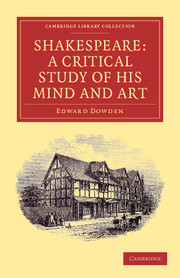Book contents
- Frontmatter
- PREFACE
- Contents
- CHAPTER I SHAKSPERE AND THE ELIZABETHAN AGE
- CHAPTER II THE GROWTH OF SHAKSPERE'S MIND AND ART
- CHAPTER III THE FIRST, AND THE SECOND TRAGEDY; ROMEO AND JULIET; HAMLET
- CHAPTER IV THE ENGLISH HISTORICAL PLAYS
- CHAPTER V OTHELLO: MACBETH: LEAR
- CHAPTER VI THE ROMAN PLAYS
- CHAPTER VII THE HUMOUR OF SHAKSPERE
- CHAPTER VIII SHAKSPERE'S LAST PLAYS
CHAPTER III - THE FIRST, AND THE SECOND TRAGEDY; ROMEO AND JULIET; HAMLET
Published online by Cambridge University Press: 29 August 2010
- Frontmatter
- PREFACE
- Contents
- CHAPTER I SHAKSPERE AND THE ELIZABETHAN AGE
- CHAPTER II THE GROWTH OF SHAKSPERE'S MIND AND ART
- CHAPTER III THE FIRST, AND THE SECOND TRAGEDY; ROMEO AND JULIET; HAMLET
- CHAPTER IV THE ENGLISH HISTORICAL PLAYS
- CHAPTER V OTHELLO: MACBETH: LEAR
- CHAPTER VI THE ROMAN PLAYS
- CHAPTER VII THE HUMOUR OF SHAKSPERE
- CHAPTER VIII SHAKSPERE'S LAST PLAYS
Summary
During the first ten years of Shakspere's dramatic career he wrote quickly, producing (if we suppose that he commenced authorship in 1590 at the age of twenty-six), on an average, about two plays in each year. These eighteen or twenty plays written between 1590 and 1600, include some eight or nine comedies, and the whole of the great series of English historical dramas, which, when Henry V. was written, Shakspere probably looked upon as complete. To this field he did not return, except in one instance when it would seem that a portion of a play on the subject of Henry VIII. was written, and while still incomplete was handed over on some special occasion to the dramatist Fletcher to expand from three acts into five. In the first decade of Shakspere's authorship (if we set aside Titus Andronicus as the work of an unknown writer), a single tragedy appears,—Romeo and Juliet. This play is believed to have engaged Shakspere's attention during a number of years. Dissatisfied probably with the first form which it assumed, Shakspere worked upon the play again, rewriting and enlarging it. But it is not unlikely that even then he considered his powers to be insufficiently matured for the great dealing as artist with human life and passion, which tragedy demands; for, having written Romeo and Juliet, Shakspere returned to the histories, in which, doubtless, he was aware that he was receiving the best possible culture for future tragedy; and he wrote the little group of comedies in which Shaksperian mirth obtains its highest and most complete expression.
- Type
- Chapter
- Information
- Shakespeare: A Critical Study of his Mind and Art , pp. 95 - 161Publisher: Cambridge University PressPrint publication year: 2009First published in: 1875

